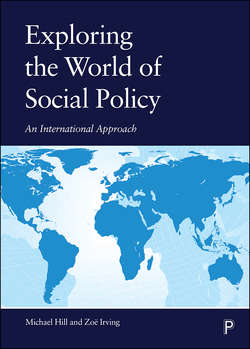Читать книгу Exploring the World of Social Policy - Hill Michael - Страница 6
На сайте Литреса книга снята с продажи.
ОглавлениеPreface
This book emerged from our desire to provide a resource for advanced students that reflected a shift in the discipline of social policy from a focus on advanced welfare states in the OECD ‘world’ to wider interest in social policy development beyond the ‘welfare state’. A commitment to taking an international approach to analyzing social policy across different countries involves not merely an interest in comparative work but also a recognition of a need for global perspectives.
Zoë Irving’s interests in reconciling comparative and global analytical interests began while completing a PhD in comparative social policy supervised by Bob Deacon, whose prescient conviction regarding the notion of ‘global social policy’ in the mid-1990s has shaped it as a field, and without whom global actors and institutions would be conceived of much less confidently in terms of their social politics. In putting these interests into practice, Zoë has since taught comparative and global social policy at several UK universities, co-founded and convened the International and Comparative Group of the Social Policy Association 2004–11 with Nicola Yeates, and with Kevin Farnsworth is co-founding editor of the Journal of International and Comparative Social Policy. Following its launch in 2012, this journal aims to bridge the gap between global and national social policy, and its acquisition by the UK Social Policy Association in 2019 is a positive consolidation of this professional and disciplinary aim. Zoë’s current research centres on two strands of interest – the social politics of crisis and austerity (with Kevin Farnsworth), and the relationship between national population size and the possibilities for social policy development.
Michael Hill is at the end of a career that may be described as twin-tracked. On the one hand, there has been his engagement in very explicitly policy-oriented research on key issues of UK social policy – race relations, unemployment, social work, housing benefit, rent control – that has led to textbooks committed to detailed accounts of UK policies. On the other hand, he has developed an expertise in the study of the policy process, and explored ways to develop the diverse literature from the US and continental Europe. This has led to fruitful collaborations with scholars from the Netherlands, Belgium, Germany and Scandinavia, and particularly writing on policy implementation with Peter Hupe. Michael has taught in several UK universities over the course of his career and has also been a visiting lecturer in many countries outside the UK including Hungary, Sweden and Taiwan. He continues to advise on research and publications, mostly from home but with visits to Denmark and Brazil in 2018–19.
Some time has passed between developing an initial idea and this book’s publication, and for their patience and support in the process we offer our sincere thanks to Alison Shaw, Catherine Gray, Vaarunika Dharmapala and all the team at Policy Press. In developing the book, it is also important to acknowledge the support of the publishers (Blackwell and later Wiley-Blackwell) of Michael Hill’s earlier work, Social Policy in the Modern World, which informed some of the content in this book, and of eight editions of Understanding Social Policy. Co-authoring the eighth edition (2009) of the latter provided the impetus for our writing partnership on this book.
As most authors acknowledge, their work is also dependent on the goodwill and encouragement of family, friends and colleagues, and we also thank them for their support. Zoë Irving would like to acknowledge the University of York MA students on the 2018–19 Global Social Problems and Global Social Policy module. Many of the chapters here were refined in learning and teaching with this superb group of students, who brought their knowledge of, and experiences from, countries in all world regions, and whose insights and engagement with most of the issues discussed in the book were very much valued. Table 7.1, which was the topic of a particularly productive and memorable teaching session (and with regret for the ‘missing data’), is dedicated to them. Our thanks too, to the anonymous reviewers who took the time to comment on the full text. We recognize our limitations in ‘exploring the world of social policy’; retaining the strengths of regime theory while attempting to step outside of this framework is a work in progress. Nevertheless, we hope that the book makes a worthwhile contribution to a widening and deepening internationalization of social policy study.
